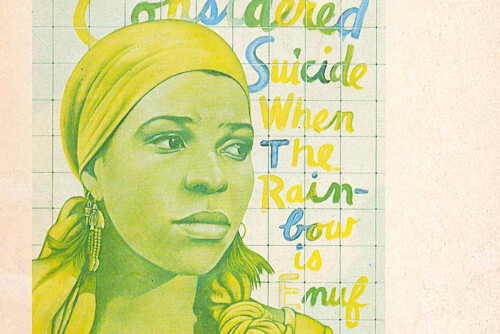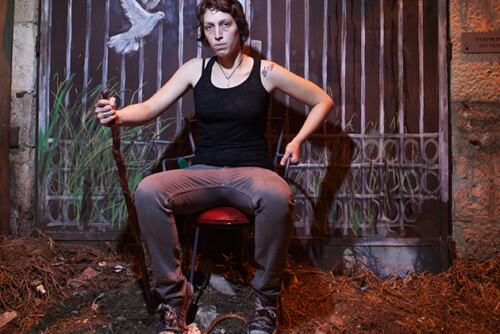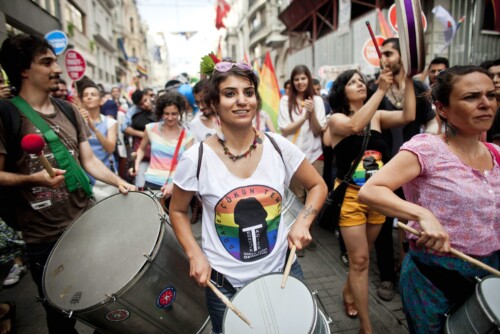Obie-Award-winning playwright, performer, and Emerson College Professor Emerita Robbie McCauley speaks about her 30-year range of experiences with for colored girls who have considered suicide / when the rainbow is enuf. Emphasizing the context of Shange’s choreopoem in black/American history and culture, Professor McCauley shares her thoughts on being a member of the play’s Broadway cast in the 1970s and the guest artist for a 2014 student production at Boston College. As the work and its performers walk a fine line between the personal and the universal, McCauley illustrates the resonance of the piece in testimony, in gesture, and in performance.
Kate Tobin: I’d like to ask you a little bit about your experience with for colored girls who have considered suicide / when the rainbow is enuf, both in the original production, and then, this past spring, at Boston College. In an interview with Lynne Tillman 22 years ago, you said: “For me, history is not stuck in the past. It has to be retold; it is not only factual. It involves who is telling and how the story resonates in the present.”
So, when we talk about history, or herstory, or what Shange called “the dark phrases of womanhood,” for colored girls represents a major public, performed rendition of black women’s telling of their stories. In your experience as part of the Broadway cast, how did for colored girls resonate with black women at that moment?
Robbie McCauley: Well, for one thing, our voices in the medium hadn’t been heard so clearly. There was Lorraine Hansberry’s traditional play, A Raisin in the Sun, which made its mark—a woman’s voice telling a story of an upward-mobile, working class family. That was remarkable in itself. for colored girls was our second drama on Broadway; and not only did we have a black woman’s voice, but she was talking about our range of experiences.
“Dark Phrases” was written after rehearsals were started—we needed an opening and Zake jotted it down, and there it was. And what I like about that particular poem is that it opens with such strong imagery: you don’t know us, and here we are.
Kate Tobin: People talk about for colored girls as a universal story, for all women, or for all black women in particular. The Boston College review of the production you were involved with last spring says that it “embraces the experience of all women of color.” Do you agree with that? You’ve said that for colored girls is relevant today, to a similar extent as it was in the ‘70s—that’s a serious accomplishment on the part of Shange, and maybe also a testament to how much has not changed since she wrote it.
Robbie McCauley: I think the subject matter is much bigger. When I use the word “bigger,” I mean that too often we and others think of ourselves as some sort of peripheral group of people. And we now know, in a bigger way, how significant we are in world culture, in world history. The presence of the black woman—her ways and means of helping all of us survive. So, it was not only ourselves, our families, and so forth; it was almost by default that black women were so significant in world culture, both symbolically as well as on our feet.
There was the raw survival aspect. The spiritual aspect. The caretaking aspect. The militant aspect. The intellectual aspect. We have such a range among us, and it comes from such a hard place that we develop from. And that doesn’t mean anything against us, you know. The story of American slavery—ripped away from one culture and having to go through the period of finding our feet in another place, and redefining ourselves, and still keeping the resonance of our original culture. Zake finds all of that in her language, in what’s resonated through her poems.
The young women that I worked with at Boston College were of so many different backgrounds, from inside and outside of the United States, and from different cultures, different languages. And I discovered something that I hadn’t even thought of before—about how our diversity resonates, women of color, and it reaches out to all women. We did sense that back in the ‘70s, too.
Kate Tobin: How do you think the actors at Boston College this past spring engaged with the play, and how was that different or similar to how you and your fellow actors encountered it almost 30 years ago?
Robbie McCauley: I think back then we were much more personal in our interpretations. We were more willing to be personal. The situations that Zake talked about were so familiar. And I think, though of course I don’t know for sure, that luckily, many of the young women I was working with had different kinds of experiences. We did do a process called story circles—where women told their personal stories. Personal stories are also, in the language that I like, bigger stories. I think it took a while for the young women to enter into the guts of the piece. And yet, because of their imaginations and because of their younger experiences, they could translate the work, and take it into their bodies. It was thought much more of choreography, rather than the body language that we came up with back then.
Kate Tobin: Were there challenges or difficulties that were common to both the Broadway production and the Boston College production of for colored girls?
Robbie McCauley: The young women at Boston College approached the work as dance and text. And I thought my input was important, so that they could make connections between movement and text that was different from dance. It’s the body language. Back then, the body language was pretty much created by the actors, with the input of Paula Moss who was the in-house choreographer, and in the play originally, too. The task of the work was to find the body in the words. Gestures. Laurie Carlos, who was one of the original members of the cast, has developed a concept called “gesture language” out of that.
Kate Tobin: For you, personally—as an actor, and then as a guest artist just recently—how has your sense of the play changed over the years?
Robbie McCauley: There’s an innovation in the play that Ntozake made—she made the Beau Willie Brown piece about a young man who had been in Iraq, rather than Vietnam. And she added a part about HIV/AIDS. Now, the production at Boston College did not add this part, but I saw another recent production that did. I thought it was well done, well written. Because I had the honor to do the Lady in Red, I was attached to the Vietnam scenario; plus, we lived through that time. The young women who worked on the piece at Boston College had lived through Iraq, and so it was appropriate for them, and the young woman who did it was amazing. So I think the familiarity worked in both ways.
Kate Tobin: What is your sense of the importance of the play for today’s generation? How do you think it affected the actors in the Boston College production?
Robbie McCauley: Speaking of history, I think that it was important that the young women at Boston College got a historical context. My capsulized version of black history—the breakage and the coming-over and the survival and the remaking—all of those aspects were something that we talked about a lot. I think the historical context is very important. And, too, it touches many aspects that are still in the culture, and not only in black culture.
Now, through the net and so forth, people are more open to each other. We see each other much more clearly across culture and class. So I think that the stories are much more viewed as universal. They’ve always been universal. That argument about the specific culture and the universal culture has been resolved, I think—what is specific is universal. We now know how women are pretty much struggling everywhere, around those issues of their bodies and their minds.
Kate Tobin: I was actually going to ask you about that. In another interview, for In Motion magazine 14 years ago, you said that you’re interested in exploring in your work “how culture and politics can connect.” It seems to me that that’s something that your work has in common with for colored girls. What do see as Shange’s lasting legacy, in terms of that interrogation of culture and politics?
Robbie McCauley: I think it’s the popularity of her work. I’m not talking about numbers, I’m talking about the placement of her work. The play was called “the sleeper” on Broadway—that means a play that runs for a long period of time, but, you know, it’s not in the paper every day, or in popular culture. The play made its place in American/world culture, on the popular side of art—with substance. With that connection between art and politics, this play ran for quite a while, and with that subject matter. So I think what Zake did that was revolutionary in terms of black art is that she lifted that subject matter to a place where it will always be known.
Kate Tobin: Do you see similarities between that and your own work, and your own interest in culture and survival and identity?
Robbie McCauley: Yes, but I also think that it is not unusual for black people in the arts. The tradition of black art incorporates that kind of awareness. Look at the Harlem Renaissance, or even at artists like Paul Laurence Dunbar—if you look at his range of work, he makes many statements about who we are, as a people. I think that awareness of having the voice, the oral, the poetic voice, is part of our culture. And of course, when you look at young people, rap and all of the above—they have to look at these sources. Zake herself came out of that period just before, with Amiri Baraka and the Black Arts Movement during the early part of the ‘60s.
There’s also music in that language. The piece was informed not only by movement, but by music. Zake talks about music, but it is not in the traditional sense. The music has to be mentioned when we talk about black culture; her work so encompasses that tradition.
Kate Tobin: How did the Boston College production incorporate music into the production?
Robbie McCauley: They played music a lot through it. And there was recorded music in the original production too. The rhythm and blues and jazz that are mentioned in the piece. And Latino music, and so forth. During the rehearsals, the women had to get back to the music because many of them didn’t know it. We used jazz as a frame for the work, and then, within that, the music that she mentions.
Kate Tobin: Is there anything else that you wanted to say or point out about the unique experience that you have with the play over the past nearly 30 years?
Robbie McCauley: I think the universality of the play is intact. I have worked with people on the play—you know, the director at Boston College was a white man. John Houchin is his name. His question was: “Can I, dare I?” My answer to that is—if you do the work. You have to do the work. for colored girls is so strong and it raises that question because of its title. And yet, it’s such a viable piece of work.



